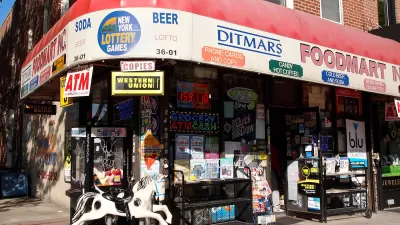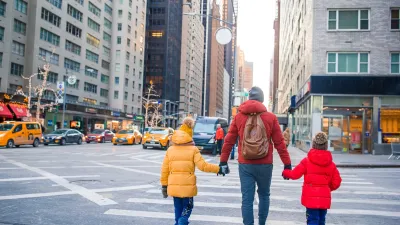Even though crime has gone down in the U.S., parents are less likely to let their children walk alone, even to school. Will Doig discusses the argument that "free-roaming" children are a benefit to themselves and the larger community.
Lenore Skenazy remembers when she was able to walk to school by herself as a kindergartner in 1960s Illinois. Since then, crime has dropped to a 40-year low, and ironically, the distance that children are allowed to walk unsupervised has also gone down. Skenazy - "who's become famous for her anti-helicopter ways" - believes that parents should be less protective and should allow their children to wander a little more freely. Part of her reasoning is for the child's independence, but she also thinks that children help to enliven the community.
"Free-roaming kids" are an easy way to measure a city's health, according to Skenazy. Her popsicle test states, "If an 8-year-old child can go get a Popsicle from the store by themselves and finish it before they get home, that city is probably thriving." Will Doig explains that a child would only be able to do that in "a walkable, reasonably safe environment that has a good pedestrian infrastructure and where retail and residences are relatively intermixed."
Doig compares the American parents' trend of hyper-supervision over their own children to the more community-based variety of child supervision practiced in Tokyo. In Japan, parents aren't allowed to drop their children off by private car. Instead of school buses, money goes to crossing guards and young children walk to school in groups without parents. Who's watching them? Other community members, such as pedestrians and shopkeepers.
Nancy Pullen-Seufert, associate director of the National Center for Safe Routes to School, points out that U.S. communities have also successfully implemented walking school buses and bicycle trains, both of which involve close parental supervision. But Doig imagines that parents would hover over their children regardless of the infrastructure's safety. "The difference between a walking school but led by a chaperone and a group of 5-year-old Japanese kids getting to school on their own is the point itself."
FULL STORY: Unleash our kids

Alabama: Trump Terminates Settlements for Black Communities Harmed By Raw Sewage
Trump deemed the landmark civil rights agreement “illegal DEI and environmental justice policy.”

Study: Maui’s Plan to Convert Vacation Rentals to Long-Term Housing Could Cause Nearly $1 Billion Economic Loss
The plan would reduce visitor accommodation by 25% resulting in 1,900 jobs lost.

Planetizen Federal Action Tracker
A weekly monitor of how Trump’s orders and actions are impacting planners and planning in America.

Waymo Gets Permission to Map SF’s Market Street
If allowed to operate on the traffic-restricted street, Waymo’s autonomous taxis would have a leg up over ride-hailing competitors — and counter the city’s efforts to grow bike and pedestrian on the thoroughfare.

Parklet Symposium Highlights the Success of Shared Spaces
Parklets got a boost during the Covid-19 pandemic, when the concept was translated to outdoor dining programs that offered restaurants a lifeline during the shutdown.

Federal Homelessness Agency Places Entire Staff on Leave
The U.S. Interagency Council on Homelessness is the only federal agency dedicated to preventing and ending homelessness.
Urban Design for Planners 1: Software Tools
This six-course series explores essential urban design concepts using open source software and equips planners with the tools they need to participate fully in the urban design process.
Planning for Universal Design
Learn the tools for implementing Universal Design in planning regulations.
Caltrans
Smith Gee Studio
Institute for Housing and Urban Development Studies (IHS)
City of Grandview
Harvard GSD Executive Education
Toledo-Lucas County Plan Commissions
Salt Lake City
NYU Wagner Graduate School of Public Service





























